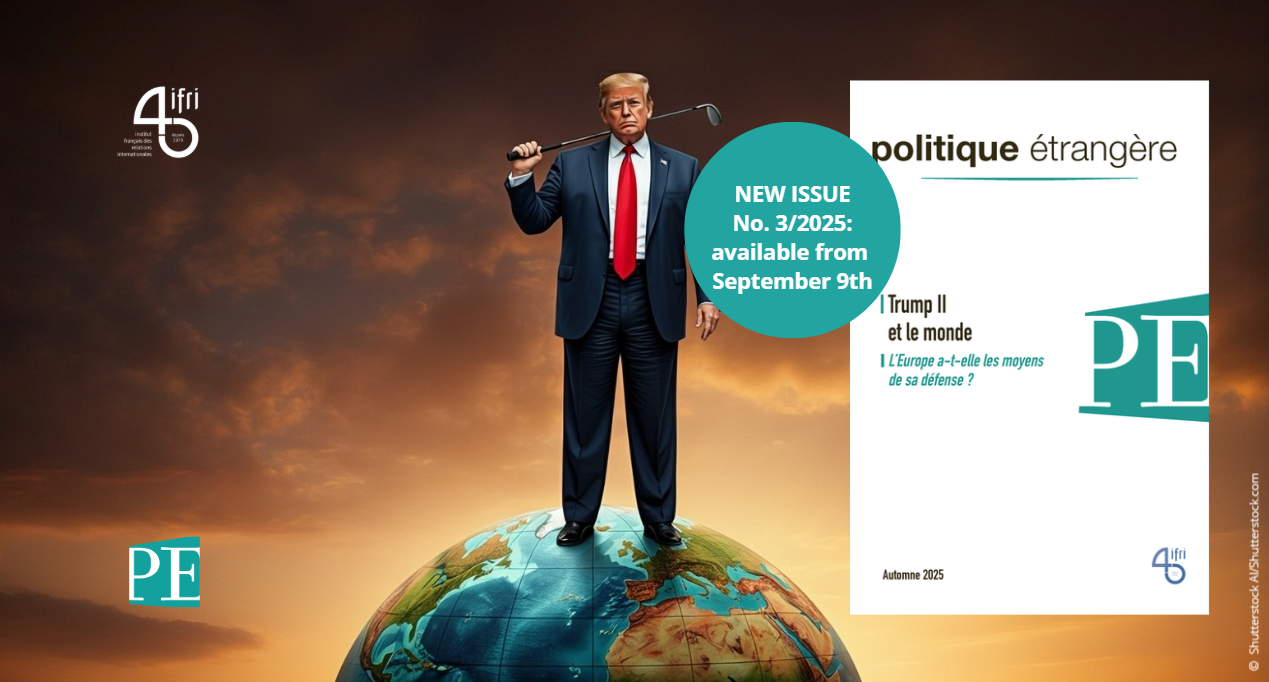United States of America
Despite polarized domestic politics and social tensions, the United States remains a major player in international relations, on the economic, military and diplomatic levels.
Related Subjects

Trump II and the World / Politique étrangère, Vol. 90, No. 3, 2025

Does Trumpism exist? And if so, how can its ideology be characterized, given the myriad currents underpinning it—from populism and the Christian Right to paleolibertarianism and technolibertarianism? Does it embody a genuine worldview that informs its diplomatic actions? An obsessive drive to overturn long-standing practices, alliances, and commitments deemed “detrimental” to American interests, coupled with a fixation on transactional, one-off deals, appears to serve as its de facto strategy—hence the widespread weakening of allied ties. Observers are equally at a loss to discern an economic strategy, and above all reluctant to anticipate the possible outcomes of its contradictory maneuvers.
The Democratic Party Under Obama and Beyond
The Democratic Party relies today on very different segments of the U.S. electorate, making it impossible for a Democratic President to sustain long-term public support. In the context of the current campaign, Prof. Nicol Rae provides an analysis of the Party's electoral strategy, since 2008 and beyond 2012.
Le conservatisme texan
Texas has its own particular brand of conservatism as a consequence of its history and geography. It emphasizes individual responsibility, distrust of government, strict morals and economic pragmatism. Its impact is important both on the state and federal level.

U.S. Demographics: The Hispanic Boom
As confirmed by the 2010 Census, Hispanics have become the largest and most dynamic ethnic minority in the United States. While still facing many difficulties, this rather diverse group is undergoing important changes in terms of political representation, economic situation and cultural recognition. It should play a growing role on the national scene in coming years.

Etats-Unis, des institutions enlisées
Many voices denounce the institutional gridlock that has gripped Washington. Indeed, filibustering in the U.S. Senate is not the only issue. Hopes of a reform are limited however.
This paper is published in French only — Etats-Unis, des institutions enlisées
L' "anti-environnementalisme", nouveau thème des conservateurs américains
Opposing environment protection policies has become a posture de rigueur for U.S. radical conservatives, especially in view of the 2012 campaign. This theme finds itself at the crossroads of several currents of American conservatism: a distrust of scientific elites, trust in the Manifest Destiny of the country, the defense of U.S. states and citizens against Washington and of the country as a whole against the rest of the World.
La Californie en 2011 : entre dynamisme et entraves
California enjoys a strong economy, backed by a strong immigration. Traditionally, this strength was reinforced by consistent investments from Sacramento, allowing for infrastructure development and education policies. In past decades, however, the idea that the state should do less has taken hold. Reforms have brought about a constant tightening of the state budget and public services. The less affluent citizens are left aside and the "social contract" of the Golden state is imperiled.
NATO Partnerships: Shaking Hands or Shaking the System?
The new Strategic Concept takes stock of the past ten years but outlines only modest objectives for the future of NATO. Partnership falls under the third core task, cooperative security. A subsequent partnership policy was unveiled, but has provided little new impetus.

Obama's Diplomacy as Showcased by Web 2.0
Obama's administration is intent on restoring the US image abroad.
Strategic Stability in the Cold War: Lessons for Continuing Challenges
During the Cold War, the phrase “strategic stability” gained currency both as a foreign policy objective and as an apt way of describing the fact that the United States and the Soviet Union never actually went to war.
Support independent French research
Ifri, a foundation recognized as being of public utility, relies largely on private donors – companies and individuals – to guarantee its sustainability and intellectual independence. Through their funding, donors help maintain the Institute's position among the world's leading think tanks. By benefiting from an internationally recognized network and expertise, donors refine their understanding of geopolitical risk and its consequences on global politics and the economy. In 2025, Ifri supports more than 80 French and foreign companies and organizations.








